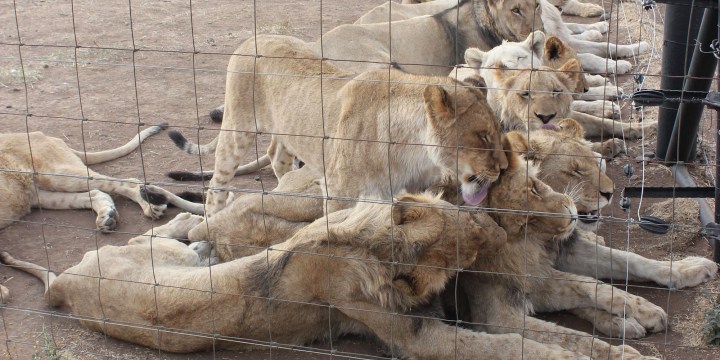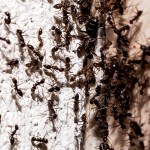ANALYSIS
Are the government’s animal welfare moves progress or ‘spookasem’?

Parliamentarians slam Departments of Agriculture and Environment for lack of answers on animal welfare.
The future welfare of wild animals in human care was in good hands, the Parliamentary Committees on Environment and Agriculture were told last week. There were neat PowerPoints and assured speakers to prove it. The facts were self-evident.
A ground-breaking High-Level Panel (HLP) Report last year by the Department of Forestry, Fisheries and Environment (DFFE) was being implemented successfully. Veterinarians in the Department of Agriculture, Land Reform and Rural Development (DALRRD) were working on an Animal Welfare Bill. Everything was under control. There was no urgency. DALLRD would hold the fort.
Was there something wrong with this picture? Yup, almost everything. It was mostly spin. Rather like praising the yellow and red in a painting mostly brown and black. At question time it began falling apart. Parliamentarians weren’t buying it. One declared it spookasem (ghost breath).
What about timelines and deadlines, they asked. Without them, assertions were merely statements of intention and who could believe those? Agriculture has been working on drafting the Animal Welfare Bill for years. When is it expected to be complete? “Around 2023 or 2024,” perhaps.
Are the departments working on standards for animal welfare? DFFE reported what it deemed progress: “A process has been initiated to obtain approval to appoint a single-source provider to conduct an extensive stakeholder consultation process in preparation of developing norms and standards.” That’s as close to “no” as it gets.
Had DALRRD and DFFE met to clarify and rectify overlapping mandates on animal welfare as required by a parliamentary colloquium resolution and recommended in the HLP Report? Yes, said the presentation. When pressed at question time for details of the meetings, DALRRD spokesperson Dr Mphane Molefe admitted these “meetings” had mainly been emails and phone calls, so there was no record.
In answer to another question, he revealed DFFE had yet to attend a meeting of the DALRRD Animal Welfare Working Group. A memorandum of understanding between them was still “in the process of being finalised” — which Environment Minister Barbra Creecy called a close working relationship.
Nine months after the HLP Report recommended that the minister “immediately initiate a process to engage with welfare and wellbeing issues across the sector”, a Wildlife Welfare Forum is still “in the process” of being established and “an inception meeting planned’, but it doesn’t cover wild animals in captivity, where the real problems lie. Its terms of reference are not yet available.
There was no mention in the presentations of the parliamentary colloquium on animal welfare scheduled for 18 March as it appears it needs to be first discussed by parliamentary committee chairs. When? Who knows?
DALRRD said it was empowered to regulate on “any other reasonable requirements which may be necessary to prevent cruelty or suffering to any animal” and DFFE had merely to ask for this to be done. But there have been no regulations promulgated to prevent the ongoing abuses of wild animals in captivity. So much for the supposedly close working relationship between the two departments.
DFFE’s High-Level Panel, endorsed by the Cabinet last year, recommended an end of intensive rhino breeding as it had no conservation value. Last week DFFE demurred:
“Given the current rhino poaching problem and the need to recover rhino populations in the wild, the captive breeding operations for rhinos will not be phased out with immediate effect.”
Further consultations will take place “on an ongoing basis”.
What about an end to captive lion breeding as recommended nearly a year ago after sector-wide consultation?
“The necessary regulatory provisions will be consulted with the public once the policy position has been implemented.” So what’s the chance of that happening? The answer was, to say the least, confusing:
“The DFFE is processing the submissions on the draft policy. Over 8,000 objections were received compared to over 14,500 national petitions and over 60,000 petitions in support were received.
“Due to the extensive nature of submissions and diversity of views received, the department has decided to first [read instead] proceed with the White Paper on Biodiversity and Sustainable use which will be the overarching policy for the sector.”
Here’s further confusion. The HLP recommended that the minister halt and reverse the domestication of lions in captivity. Under the watch of her department, the National Environmental Management Laws Amendment (NEMLA) Bill will enable the minister to do exactly that by passing regulations prohibiting violation of the wellbeing of animals. So why not just do it?
There was also an issue with the NSPCA. As the primary agency dealing with animal welfare, it should surely be central to any debates on the issue. But it was still “about” to be invited to the drafting team of vets in DALLRD.
Furthermore, though it’s a statutory body, it’s not funded by government (it lost its Lotto funding in 2017; why?) and has to rely on charitable grants, so lacks the capacity to adequately fulfil its mandate. Instead of strengthening its financial support, DALLRD recommended forcing government representatives and “other” organisations onto its board and delegating powers of welfare inspections to “other suitable qualified people”. A clear vote of no confidence.
Although DALLRD’s Molefe gave comforting assurances that the NSPCA adequately enforces the Animal Protection Act, in reality it faces considerable difficulties in getting access to premises where suspected abuse takes place, as well as then persuading the National Prosecuting Authority to prosecute. The result is an average of only about 10 prosecutions a year.
There seemed to be confusion about consultations and what ends up as law. Environmental NGOs expressed alarm on hearing that DALLRD’s bill-drafting team considered the 1962 Animal Protection Act to be adequate, merely requiring some adjustments, whereas it is completely out of date and no longer fit for purpose.
Molefe simply wants a new act with empowering provisions that allow the minister to regulate as she sees fit. This method of legislating is becoming more prevalent and is extremely dangerous as regulations evade parliamentary scrutiny.
There was also the confusion of the order of reports laying the basis of an act. It was stated that a White Paper would come before a policy paper when the reverse is standard practice. Deadlines? Naah, no mention.
There were some surreal interchanges about animal sentience. How did the Agriculture Department define it, asked the DA’s Dave Bryant. Could the department provide a list of those it considered sentient and those which were not? Molefe implied there was a scale, with ants at the bottom.
And if sentience was defined as creatures that could feel pain, there were cultural problems, he said. In some rituals, the animal bellowing in pain was speaking to the ancestors and essential to the ceremony. Was there a middle ground between science and belief, he wondered.
Here’s the kicker. This was a report to Parliament about animal welfare. But representatives of neither department were able to coherently define welfare or wellbeing or the difference between the two. Narendnd Singh of the IFP summed up the report-back in a single sentence: “Lots of intentions but unfinished business.”
Meanwhile, more than 10,000 lions languish in appalling conditions, trade in their bones has not been halted, breeding rhinos to limited bulls in captivity is leading to genetic bottlenecks and the status of more than 100 wild animals effectively reclassified as farm animals under DALRRD remains unclear. DM





















 Become an Insider
Become an Insider
It is interesting that Pinnock decries an alleged lack of consultation in respect of the award of exploration and prospecting permits but ignores the much more egregious lack thereof in respect of initiates such as the HLP that are close to his heart. Animal welfare is important and there is a need to regulate the captive breeding of lions, not as he ludicrously suggests because 10 thousand lions are living in appalling conditions, but rather because just as some members of the animal rights movement are unscrupulous so are some who engage in the captive breeding of lions. The NSPCA’s discriminatory employment practices, for example, are incompatible with its role and there are many examples of applying its beliefs rather than the law. It is in urgent need of reformation. The HLP process was a travesty and has been roundly condemned as such by pretty much all but those who occupy the lunatic fringe of organisations such as the animal rights movement. Sentience and the idea that dogs should have rights like people is not the silver bullet the animal rights movement claim. . Animal welfare is a complex issue that needs to evolve to reflect the mores of South Africa as a whole rather than the beliefs of the animal rights movement. The bigoted dogma of the animal rights movement is making this task much more difficult.
Hi Ian, There was extensive public and inter-organisational consultation on the HLP for at leasxt a year and almost none on the allocation of prospecting permits. Just have a look at what’s happening on the West Coast right now.
You should do a bit of homework before making accusations on a public platform.
Don, you are absolutely wrong which is perhaps why your article under reply has been buried by the DM. I could not find it on today’s home page or even that of the burning planet. It seems I am the only person who bothered to comment on it. That should tell you something but probably won’t.
The extensive consultation process you speak of was so bad that even members of the panel complained that they were not properly consulted.
You are also wrong about doing my homework. I do so but I do not always claim to be right. No one who engages in difficult issues is, which is another reason why the bigotry that is evident in both your article and your response to my response is so unattractive.
Other voices need to be heard.
I have read the West Coast application papers and I am reasonably confident that on a proper application of law the respondents should win going away. The fact that there is concern that they may not is a testament, I think, to the fact that propaganda campaigns, such as the one you are currently engaged in, work even in what ought to be the protected ground of the judiciary.
Judge Thulare has an unenviable task in that he now must choose between applying the law as he ought and making a decision that goes against the flow of his earlier decisions or sticking with the mob.
I am an atheist but even I find myself praying that he has the courage to apply the law rather than run with the mob you have played such an active role in creating.